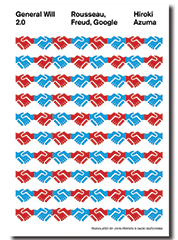Stay informed. Talk about the issues. Always be engaged. Liberal societies have encouraged their members to take part—or at least interest—in politics. Yet, even in developed nations where it is said to work, the democratic process as we know it routinely fails to give voice, on the one hand, and to appeal at all, on the other hand, to a good number of citizens.
Whatever countervailing hopes the worldwide web gave rise to in its dawning years, far from restoring the “public sphere” of yore, the internet has completed its fragmentation. According to Japanese thinker Hiroki Azuma, the way forward must be sought through what network technology is actually good at: aggregating and processing the traces we leave (without always meaning to) every time we wade into the world of connectivity. Harking back to Rousseau and his idea of the general will, dropping by Freud and his discovery of the unconscious, taking inspiration from Google and the tenor of its innovations, revisiting Christopher Alexander and his highway planning, and making curious bedfellows of Twitter, Rorty, and Nozick, General Will 2.0 is a wild ride bound to delight not just citizens who “care” but those who find doing so to be increasingly difficult and false.
One of Japan's leading critics and NY Times Editorial Contributor. Hiroki Azuma is Asia's prermier philosopher and literary critic. While he made a name for himself in academia with a look at the growth of technology through modern media, Azuma has looked at culture and humanity from a historical perspective as well describing Japan's cultural shift after the Tohoku Earthquake for the NY Times or revealing the power of social networking through Twitter and Google online and in the classroom.
Co-director of the Center for the Study of World Civilizations’ Academy of Humanities, Tokyo Institute of Technology, Hiroki Azuma is also the author of Otaku: Japan’s Database Animals (University of Minnesota Press)